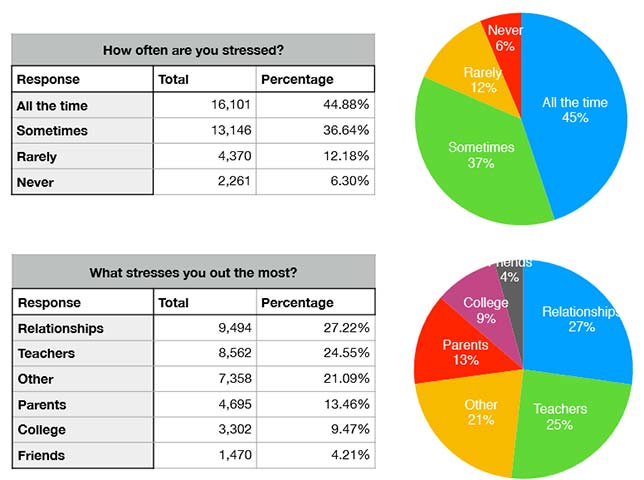Apps and Online Programs Main Means for Teens to Cope with Stress
- By Dian Schaffhauser
- 03/05/18
Turning to apps and online tools is the most popular way for teenagers to deal with stress. And they report feeling a lot of it.
A social network specifically for teens, After School, ran a poll that received responses from nearly 36,000 high schoolers who answered four questions:
- How often are you stressed?
- What stresses you out the most?
- What are you most likely to do when you're stressed?
- What resources do you use to help?
Four in 10 respondents (45 percent) said they're stressed "all the time." A slightly lower number (37 percent) said they feel stressed sometimes. Only two in 10 reported feeling stressed rarely or never.

The biggest sources of stress are relationships (mentioned by 27 percent), teachers (25 percent), parents (13 percent), college (9 percent) and friends (4 percent). The remainder referenced other stressful factors.
Eleven percent of teens in this poll said they turn to drugs or drinking to relieve the stress. Twice as many (22 percent) talk to friends. A similar number (20 percent) take to eating. And 14 percent choose working out. About a third of the poll-takers said they do nothing (17 percent).
The primary resource that provides help is digital — apps and online services — mentioned by 44 percent of respondents. Just 5 percent turn to therapists, and 3 percent choose teachers. A full third (35 percent) specified "nothing," and 14 percent chose "other."
The poll was developed as part of an After School annual event, "Social Media Safety in Schools," which convened 50 students, mental health experts and social media company representatives to explore ways of using technology to help reduce suicide rates and improve teen mental health.
"We need to bring the students into the mix. It's their voice. They really have the most power to change these cultural norms around mental health and suicide," said participant Jonathan Frecceri, principal for Lydian Academy, a Menlo Park, CA middle and high school whose tagline is, "School Success Without the Stress."
About the Author
Dian Schaffhauser is a former senior contributing editor for 1105 Media's education publications THE Journal, Campus Technology and Spaces4Learning.